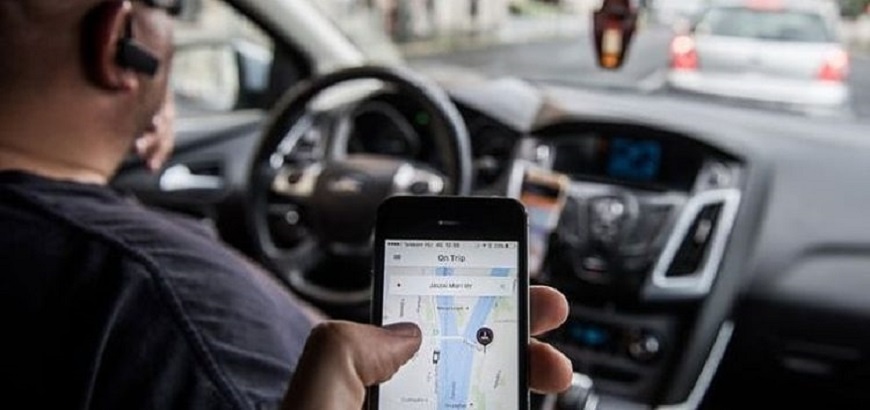Auto
Lagos Reduces License Fees, Scraps 10% Tax for e-Hailing Services

By Adedapo Adesanya
Following negative reactions that trailed its planned action, the Lagos state government has adjusted regulatory requirements for ride-hailing services operating in the state.
In newly updated requirements, the government has slightly reduced the proposed licence fee and has introduced a road fund and raise more questions on data sharing and vehicle requirements.
Business Post reported last week that ride-hailing platforms like Uber, Bolt, among others which operate in the commercial city will pay a 10 per cent tax on every ride alongside other license fees and sharing of their operational data.
It was also disclosed that companies with less than 1,000 drivers were expected to pay N10 million licence fee, while those with more than 1,000 drivers were to pay N25 million.
The state then noted that subsequent renewals would cost N10 million for those with more than 1,000 drivers and N5 million for others.
In the newly revised policy, the Lagos State Commissioner of Transportation, Mr Frederick Oladeinde, has disclosed that in place of the 10 per cent service tax for every trip, a Road Improvement Fund has been introduced and a flat fee of N20 will be charged for every transaction.
Mr Oladeinde also added that operational licence fee has been reduced by 20 per cent. This means those with more than 1,000 taxis will now pay N20 million instead of N25 million while those with less will pay N8 million in place of the former N10 million.
It also noted that app operators (those without cars but allow its services) more than 50 cabs on their platforms will pay N8 million while those N50 cabs will pay N4 million.
Initially, the date for the implementation was set for Thursday, August 20 but has been shifted by a week and will now commence on August 27.
The state government also noted that drivers have been given 90 days to comply with all necessary documentation.
According to the commissioner, there will be a one-stop-shop for all the documentation, especially LASSRA Card- Lagos State Resident Registration Agency.
The commissioner reiterated the fact that there must be due diligence on drivers and riders should desist from offline trips and transactions.
Clarifying the data issues, Mr Oladeinde noted that, “The data they will be supplied to us is going to be encrypted. We don’t want detailed data, just on movement, from point-to-point, it’s going to be encrypted so that all the information is taken off.”
According to him, the data will ensure more planning and to enable the government to deploy resources to places faced with congestion.
“We are not asking for data on people’s details, where they came from or where they are going to. We just want point-to-point data,” he added.
Mr Oladeinde insisted that vehicle guidelines, which includes a brand new vehicle of 1.33cc with a taximeter among others, were not meant for e-hailing companies, but for what they call corporate cabs.
Auto
inDrive Ranks Second in Ride-Hailing App Downloads Globally

By Modupe Gbadeyanka
A global mobility and urban services platform, inDrive, for the fourth consecutive year, has emerged as second in ride-hailing app downloads in the world.
In its latest report, a leading market intelligence firm, Sensor Tower, also disclosed that the company ranked fourth globally in the travel category for downloads, up from fifth place in 2024, reflecting growing engagement as it continues its transition into a super app.
It was also revealed that inDrive was ranked number one in the travel category by downloads in nine countries, with newcomers to the list including Peru and Pakistan, and placed among the top three most downloaded travel apps in 22 countries.
The chief executive of inDrive, Mr Arsen Tomsky, while commenting on these feats and others, said the continued rise underscores a broader shift toward multi-service platforms that deliver everyday value while remaining closely aligned with local market needs and user expectations.
“Maintaining our position as the world’s second most downloaded ride-hailing app for a fourth consecutive year is a powerful validation of the value inDrive delivers to its users every day.
“This recognition reflects the trust people place in our platform and the continued dedication of our global team.
“As inDrive evolves into a super app, we remain focused on our core principles of fairness, transparency, and user choice, while expanding access to services that make a meaningful difference in people’s daily lives,” Mr Tomsky said.
The latest report highlights that super app ecosystems are becoming a key growth driver for the ride-hailing industry, particularly in emerging markets where users are engaging more frequently and across a broader range of use cases.
The inDrive app – defined by its peer-to-peer pricing model that allows drivers and riders to agree on a fair price mutually – has now been downloaded over 400 million times since its launch. Available in 1,065 cities worldwide, it has facilitated more than 8 billion transactions.
The platform operates across 48 countries, driven by strong global adoption, including growing momentum across Africa and continued growth in Nigeria.
In 2025, inDrive accelerated its transition into a super app, expanding beyond its core ride-hailing offering to offer additional services, including intercity transportation, courier, grocery delivery, and financial services.
By expanding its offering and meeting more of its users’ daily needs, inDrive is driving deeper and more frequent user engagement – an approach that underpins its continued global momentum.
Technology under the hood, including AI and advanced analytics, plays a significant role in supporting this evolution by enabling greater personalization and more seamless user experiences.
From using machine learning to fix mapping gaps and deliver more accurate ETAs, to predictive analytics that anticipate user needs and personalize service offerings, these capabilities drive innovation. In contrast, ensuring users retain complete control over pricing decisions is consistent with inDrive’s commitment to fairness through choice.
Auto
GoCab Receive $45m to Scale Ethical Mobility Financing Platform

By Dipo Olowookere
A funding package of up to $45 million has been secured by a mobility fintech firm, GoCab, to scale its ethical mobility financing platform across emerging markets.
A statement made available to Business Post disclosed that the funds comprise $15 million equity and $30 million debt, with the equity round co-led by E3 Capital and Janngo Capital. Others involved in the transactions were KawiSafi Ventures and Cur8 Capital.
GoCab operates a drive-to-own mobility fintech model that provides credit to gig-economy workers to buy their own car, bike and others in emerging markets.
It offers vehicles in drive-to-own programmes, mobile phone BNPL, motorbike financing for delivery couriers, and other value-added services through a single digital platform powered by proprietary technology.
With this financing support, GoCab plans to expand its operations and fleet, aiming for 10,000 active vehicles and $100 million in annual recurring revenue within the next 24 months.
Across five markets, GoCab now generates over $17 million in Annual Recurring Revenue (ARR) after just 18 months of operations and is on target to reach $50 million by end of 2026 and $100 million in 2027.
The company was established in 2024 by Mr Azamat Sultan and Mr Hendrick Ketchemen to address the limited access to ethical financing and vehicle ownership for gig-economy workers in Africa.
By combining mobility, technology, and inclusive finance, the organization enables drivers and delivery couriers to generate stable income while progressively gaining ownership of their vehicles.
By 2025, GoCab had taken a leading position in several African markets, supporting thousands of drivers and contributing to cleaner, more sustainable urban mobility systems.
“Transforming lives and improving the daily reality of thousands of families is the mission we have set for ourselves. We believe that capital can and must become a powerful force for transformation across Africa and emerging markets,” Mr Ketchemen said.
His counterpart, Mr Sultan, disclosed that, “For us, GoCab is about restoring dignity and opportunity through ownership.
“Across Africa, millions of people are locked out of both mobility and finance. We saw how capital was flowing everywhere except to the people who actually needed it to work.
“This round allows us to scale responsibly expanding access to fair, ethical financing while accelerating the transition to electric mobility, lowering carbon emissions, and building a more inclusive and sustainable future in close alignment with our investors.”
One of the investors, Mr Vladimir Dugin of E3 Capital, said, “The shortage of vehicles and the high cost of transportation remain two of the most pressing challenges across Africa. GoCab is addressing both head-on through a data- and technology-driven platform that expands access to mobility while improving efficiency at scale.
“Its rapidly growing EV fleet lowers costs for riders and drivers alike, while significantly reducing emissions. We are proud to support GoCab as it builds the leading pan-African mobility platform for the future.”
“We are proud to lead GoCab’s $15 million equity round, catalysing over $30 million in debt financing. We were impressed by their vision, their world-class team, and the quality of their execution.
“With this funding, GoCab now has the scale to deploy thousands of productive vehicles, each supporting a full-time income.
“With a clear operational roadmap toward 10,000 active assets and $100 million in recurring revenue, GoCab illustrates how ethical financing can translate into tens of thousands of decent jobs, household resilience, and sustainable growth at scale,” the chairman of Janngo Capital, Fatoumata Bâ, stated.
Also, a partner at KawiSafi Ventures, Mr Marcus Watson, said, “GoCab is building critical infrastructure for climate-smart mobility and the future of work in emerging markets. The combination of disciplined execution, strong unit economics, and a clear impact thesis makes GoCab a compelling platform for sustainable growth.”
Auto
Demolitions: inDrive Shares N75m Relief Packages to Displaced Lagos Residents

By Modupe Gbadeyanka
Over N75 million worth of relief materials have been provided by foremost ride-hailing platform, inDrive, to residents of Lagos State displaced by recent demolitions in the metropolis.
The company partnered with Tolu Aniwura Welfare Foundation (GenerousMe) to distribute essential food, clothing, and school supplies to more than 2,000 affected individuals and families.
At the distribution of the items at St. Paul Catholic Church, Ebute-Metta, the Country Representative for inDrive Nigeria, Mr Timothy Oladimeji, explained that the initiative reflects the company’s people-first approach and its commitment to responding directly to urgent community challenges while maintaining a focus on long-term empowerment across its markets.
“At inDrive, we believe that our responsibility goes beyond providing mobility services; it extends to standing with communities during moments of need.
“The recent demolitions left many families vulnerable, and through our partnership with GenerousMe, we were able to respond quickly and responsibly. This intervention reflects our commitment to fairness, empathy, and ensuring that people remain at the centre of everything we do,” Mr Oladimeji said.
It was gathered that the support also extended to individuals who had previously benefited from inDrive-backed social impact programmes, reflecting the company’s continued commitment to empowering vulnerable communities across Nigeria.
The relief packages included essential dry food items such as rice, beans, garri, noodles, spaghetti, cooking oil, tomato paste, seasoning cubes, and salt. Beneficiaries also received clothing, blankets, sleeping mats, mosquito nets, rechargeable lamps, power banks, and baby care items, as well as school packs containing bags, exercise books, and writing materials for children.
In his remarks, the Partnerships Lead for GenerousMe, Mr Adetola Alade, said, “Partnering with inDrive enabled the timely and coordinated delivery of aid. We prioritize speed and collaboration in responding to urgent humanitarian needs, and working with inDrive on this project was a great experience.”
-

 Feature/OPED6 years ago
Feature/OPED6 years agoDavos was Different this year
-
Travel/Tourism9 years ago
Lagos Seals Western Lodge Hotel In Ikorodu
-

 Showbiz3 years ago
Showbiz3 years agoEstranged Lover Releases Videos of Empress Njamah Bathing
-

 Banking8 years ago
Banking8 years agoSort Codes of GTBank Branches in Nigeria
-

 Economy3 years ago
Economy3 years agoSubsidy Removal: CNG at N130 Per Litre Cheaper Than Petrol—IPMAN
-

 Banking3 years ago
Banking3 years agoSort Codes of UBA Branches in Nigeria
-

 Banking3 years ago
Banking3 years agoFirst Bank Announces Planned Downtime
-

 Sports3 years ago
Sports3 years agoHighest Paid Nigerian Footballer – How Much Do Nigerian Footballers Earn













